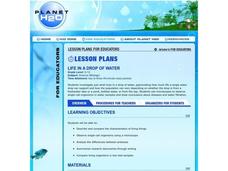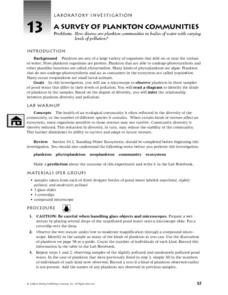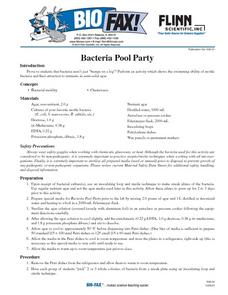Curated OER
Chemosynthesis for the Classroom
Explorers set up Windogradsky columns with local mud so that they can culture microorganisms. After three and six weeks they make observations of the mud and the organisms growing in it. In this way they observe succession and relate...
Nuffield Foundation
Dissecting Lungs
Here is a lab activity where teens experience the respiratory system first-hand as they dissect lungs and identify key structures within the system. Although the website is written in British English with some slightly different verbiage...
Curated OER
SEXUAL LIFE CYCLE DEVELOPMENT USING MONOCYSTIS
High schoolers perform a lab to becoe familar with scientific concepts. The skill of inquiry is essential and this lesson furthers its development. The intelligence of kinesthetics is used as learners perform the many aspects of this lab...
Curated OER
Bacterial Transformation
Learners explore DNA recombination. In this biology lesson, students observe the growth of microscopic species. They predict the phenotype of the transformed colonies.
Curated OER
Temperature Affects The Heart Rate
Students relate heart rate and development to environmental conditions through experiment. In cooperative groups, students record the heart rate in developing zebra fish. Groups create a standard curve to predict the temperature at...
Curated OER
Cell Cycle, Mitosis and Meiosis
Seventh graders describe the processes involved in mitosis and meiosis. In this life science instructional activity, 7th graders create chromosome models using strings and beads. They play a jeopardy team game at the end of the unit to...
Curated OER
The Effect of Natural Selection on Genes, Traits and Individuals
Rotating through five stations, evolutionary biologists explore the question of how changes in DNA facilitate the changes in a population over time. High-quality, colorful cards of animals, skeletons, skulls, and DNA sequences can all be...
Curated OER
DNA Blueprint for Life
Students isolate DNA from different food sources. In this biology lesson, students research DNA extraction. They analyze DNA stands collected from the lab, and compare the differences between each.
Curated OER
Life in a Drop of Water
Students examine the structure, function, and characteristics of microscopic organisms that inhabit freshwater through collection of water samples and observation through microscopes.
Curated OER
Inquiry in Science Using an Animal Behavior Model
Students observe a planaria without a microscope and with a stereoscopic microscope. They draw the planaria and describe its motion and eating habits. Students research planarias various body systems and behavior. They design an...
Curated OER
PARAMECIUM RESPONSES TO STIMIULI
Students design the test they use to examine, how the paramecium move, feed, and react to different types of stimuli such as a drop of vinegar. They conduct a lab experiment using a microscope.
Curated OER
Sea Urchin Embryology
Students explore the process of evolution. They examine examples of how homeotic genes may work and obtain gametes. Using a microscope, students observe the fertilization of sea urchins. They video tape the process and write a...
Curated OER
A Survey of Plankton Communities
In this biology worksheet, students identify and define the vocabulary terms listed and make a prediction about the outcomes of the experiment. Then they complete the chart of the observations of the plankton diversity in drops of pond...
Curated OER
Mission Possible
Young scholars, in teams, solve a crime using forensic lab techniques. They apply lab techniques to a real life situation using a crime scenario that takes place on campus. Sample activities include Blood, Fiber, and Hair Lab.
Curated OER
Comparing Ovaries And Testes
In this reproductive system learning exercise, students compare specimens of rat ovaries and testes. They complete 5 short answer pre-lab questions, follow an 11 step procedure and answer 5 analysis questions.
Curated OER
Science: Bees: An Interdisciplinary Approach
Students investigate the world of bees and describe their characteristics. by identifying the bees' parts, they demonstrate how these parts function. In the lab, students dissect bees and view the various parts under microscopes. ...
Curated OER
Elegant Embryology
Students observe embryogenesis in action through early stages of development of eggs. They observe cultures with dissecting and compound microscopes. They draw their egg, record any details and observe for changes. They compare their...
Curated OER
Case Study Two: Shark Dissection
Students read an article on sharks prior to beginning a dissection lab. As part of the lab, students identify differences between the shark anatomy and human anatomy and hypothesize why those differences exist.
Curated OER
Bacteria Pool Party
Students investigate the organisms of bacteria. They are given a culture of bacteria that can be observed under a microscope. The students make observations that are recorded. The instructional activity includes the mention of specific...
National Nanotechnology Infrastructure Network
Powers of Ten with the Blue Morpho Butterfly
Explore the powers of ten while examining a Blue Morpho butterfly wing. Learners discover there is a lot more than meets the eye when one looks close enough.
Curated OER
Investigation of Meiosis in Common Plants and Animals
Students witness various stages of mitosis through preparing onion root tip slides. With teacher guidance, they learn a great deal through the hands-on process of preparing the slides themselves.
Curated OER
Pollen Tube Growth
High schoolers demonstrate the proper usage of the compound and dissecting microscopes. They identify the parts of a flower and the functions of the flower parts. Students describe the process of gamete formation and fertilization in a...
Curated OER
Water Quality Monitoring
Students study the water quality of a stream in their area, by measuring the temperature, pH, alkalinity and conductivity. They integrate biology with earth science when using the microscope to study the living organisms in the water.
Curated OER
Norman Suburban Activity
Students analyze the factors affecting organisms in the pond ecosystem. In this environmental science lesson, students perform an experiment to determine pH, nutrients and temperature of different pond sites. They present their result to...

























